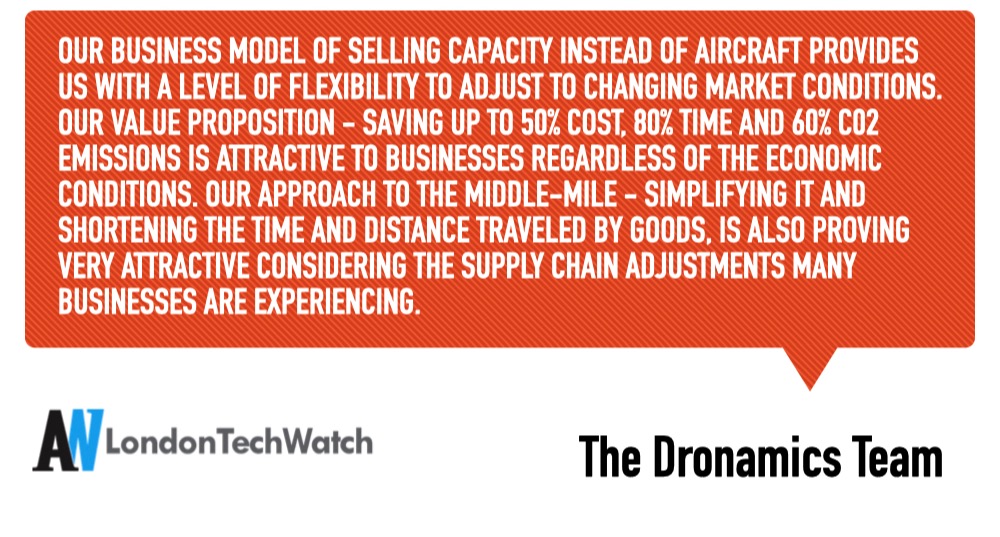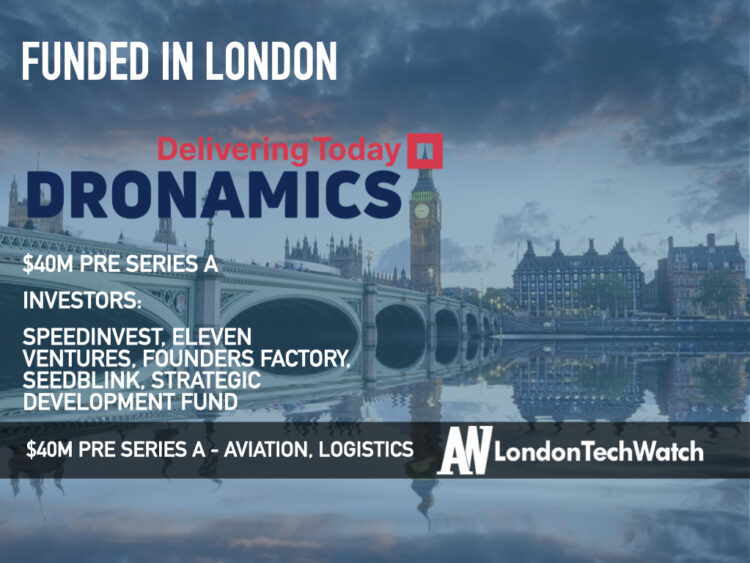The promise of autonomous drones is starting to be seen in applications across a wide spectrum of use cases whether traffic surveillance, weather forecasting, disaster response, agricultural monitoring, surveying and site inspections, and even entertainment. Since the turn of the century, armed unmanned aerial vehicles have been used to carry out sophisticated military operations. The next frontier where drones are being incorporated is in the logistics space for freight and transportation. Dronamics is the world’s first drone airline focused on facilitating cargo shipments for middle-mile delivery. The company’s signature Black Swan drone can carry up to 350KGs (capacity equivalent to that of a delivery van) of cargo up to 2,500KM at a fraction of the cost and carbon emissions of traditional fossil fuel-burning alternatives. The large payload and range allow for same-day shipments across the whole of Europe, serving a wide range of supply chains. The company’s droneports can be established anywhere that offers a 400-metre airstrip (~length of the Eiffel Tower). Dronamics is currently conducting test flights with Spain, Portugal, Italy, Greece, and Bulgaria targeted as initial markets in phase one of the public rollout later this year.
London TechWatch caught up with Dronamics team to learn more about the business, the company’s strategic plans, latest round of funding, which brings the total funding raised to $59.6M, and much, much more…
Who were your investors and how much did you raise?
Dronamics has raised a total of $40M in pre-Series A funding from angel investors and venture capital funds. Thеse include Founders Factory, Speedinvest, SeedBlink, Eleven Capital, and most recently the Strategic Development Fund (SDF), the investment arm of the Tawazun Council, Abu Dhabi, United Arab Emirates.
The $40 million is in addition to the €2.5 million ($2.7 million) grant Dronamics was awarded by the European Commission under the selective deep-tech European Innovation Council (EIC) Accelerator program, and the EIC’s material commitment to support Dronamics’ Series A round with another €12.5 million ($13.45 million) in equity investment.
Tell us about your product or service.
Dronamics is a cargo drone airline that specializes in middle-mile logistics. Our flagship Black Swan drone is capable of carrying up to 350 kg (770 lb) over distances of up to 2,500 km (1,550 mi), enabling same-day shipping over long distances for industries ranging from pharma to e-commerce. Our high-payload and long-range drones are uniquely suited for middle-mile logistics and offer significant cost, time and co2 savings compared to traditional freight. We can reduce shipping costs by up to 50% while also reducing the time traveled by goods by up to 80% and co2 emissions by up to 60% – and we have a concrete plan to get to net-zero. Our ultimate goal is to enable same-day delivery for everyone, everywhere.
What inspired the start of Dronamics?
Dronamics was founded in 2014 by Svilen Rangelov, an entrepreneur and economist, and his brother Konstantin, an aerospace engineer, with the intention to solve a simple problem: how to get a package across Europe at a competitive price, quickly and reliably. The company now employs more than 150 people in 12 countries and is the world’s first cargo drone airline with a license to operate in Europe.
How is it different?
Traditional aircraft is built for passengers not cargo, which makes them very inefficient for the transportation of goods. The Black Swan was designed specifically for cargo, optimizing the space, resulting in a superior load capacity. It has been built to have the same capacity of a small van, so that the cargo can be directly unloaded and loaded from a van to the Black Swan and vice versa. Think of it as a flying van!
Traditional aircraft is built for passengers not cargo, which makes them very inefficient for the transportation of goods. The Black Swan was designed specifically for cargo, optimizing the space, resulting in a superior load capacity. It has been built to have the same capacity of a small van, so that the cargo can be directly unloaded and loaded from a van to the Black Swan and vice versa. Think of it as a flying van!
This, coupled with aerodynamic design which ensures low consumption, gives it a fuel efficiency advantage compared to conventional aircraft (at 5.8 l per 100 km / 1 gal per 50 mi – the equivalent of a small car). Also, Dronamics is the first cargo drone airline with license to operate in Europe and we will start commercial flights in the continent in 2023.
What market are you targeting and how big is it?
Our initial focus is on developing the European market, with plans to expand into other high-demand markets such as ME, APAC and North America in the future.
In terms of the size of the market we are targeting, the global drone logistics market is expected to grow significantly over the next few years, and we believe we are well-positioned to capture a significant portion of this market. A recent market study by Oliver Wyman has established that the extra-urban cargo drone market is projected to reach €24 bn by 2035.
What’s your business model?
Our business model is based on selling capacity rather than selling aircraft. We offer an all-in-one solution for middle-mile logistics powered by three main elements: the Black Swan cargo drone, which is capable of enabling same-day delivery to even the most remote areas at a lower cost and with less environmental impact than traditional transportation methods. Our network of droneports, which can be deployed at regional airports, airfields, and even logistics lots. And, fully mobile ground control and cargo handling operations.

How are you preparing for a potential economic slowdown?
Our business model of selling capacity instead of aircraft provides us with a level of flexibility to adjust to changing market conditions. Our value proposition – saving up to 50% cost, 80% time and 60% c02 emissions is attractive to businesses regardless of the economic conditions. Our approach to the middle-mile – simplifying it and shortening the time and distance traveled by goods, is also proving very attractive considering the supply chain adjustments many businesses are experiencing.
What was the funding process like?
So far, our fundraising has been pre-Series A.
What are the biggest challenges that you faced while raising capital?
Raising capital can be a challenging process for any businesses, especially where the sector it is operating in is still nascent. We cross over three industries – aviation, logistics, and deep tech. In aviation, for example, the heavily regulatory landscape can be a challenge and a barrier for investors.
What factors about your business led your investors to write the cheque?
Our investors were drawn to the potential of our business proposition – providing an innovative, cost-effective, and environmentally-friendly logistics solution through our cargo drone solution. Our track record of strategic partnerships with industry leaders, and the potential to revolutionize the cargo industry played a significant role in demonstrating the potential. Additionally, our experienced team, with a proven track record in aviation, logistics, and tech, provides confidence in our ability to deliver on our business plan.
Our investors were drawn to the potential of our business proposition – providing an innovative, cost-effective, and environmentally-friendly logistics solution through our cargo drone solution. Our track record of strategic partnerships with industry leaders, and the potential to revolutionize the cargo industry played a significant role in demonstrating the potential. Additionally, our experienced team, with a proven track record in aviation, logistics, and tech, provides confidence in our ability to deliver on our business plan.
What are the milestones you plan to achieve in the next six months?
Over the next six months, we will be focused on our ongoing flight test program and the Series A funding round.
What advice can you offer companies in London that do not have a fresh injection of capital in the bank?
Our industry is very capital intensive and we acutely understand the challenges of funding and scaling. Funding can come in different ways, for example, grants and government funding towards innovation and tech are worth exploring too.
Where do you see the company going now over the near term?
We continue to focus on our main goal of enabling same-day delivery for everyone, everywhere. Everything we do lathers up to that.





